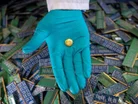Rockwell Automation & The Royal Mint Transform E-Waste

Rockwell Automation's PlantPAx Distributed Control System (DCS) is at the heart of an innovative initiative by The Royal Mint to address one of the most pressing environmental challenges of our time: electronic waste (e-waste) a Scope 3, Category 5 | Waste generated in operations. As the global production of e-waste continues to rise, Rockwell's technology is enabling the recovery of valuable materials like gold, helping to reduce the environmental impact of traditional mining practices and potentially cutting down Scope 3 emissions.
The growing challenge of e-waste
Electronic waste is one of the fastest-growing waste streams globally, with an astounding 62 million tonnes generated in 2022. The waste often contains valuable metals, such as gold, silver, and copper, alongside toxic substances that pose significant environmental and health risks.
The disposal of these toxic components can contaminate soil and water, leading to long-term ecological damage.
The Royal Mint's precious metals recovery facility
Founded in 886 AD, The Royal Mint has a long history of innovation and adaptability. It has now embarked on a mission to address the e-waste crisis with its new Precious Metals Recovery Facility.
The facility efficiently leverages Rockwell Automation's PlantPAx DCS to extract gold from discarded electronics. By focusing on recovering gold from e-waste, The Royal Mint aims to reduce its dependence on newly mined gold, which has a substantial environmental footprint.
"The successful collaboration with Rockwell and the deployment of its DCS solution allowed us to demonstrate the technical viability of the technology to operate at scale. This puts us firmly on the road to our 4,000-ton per annum target, and discussions are already well underway regarding usage of the recovered materials, as are the plans to expand the technology further."
Reducing the environmental impact of gold mining
Traditional gold mining is a resource-intensive process that often results in significant environmental degradation, including deforestation, water pollution, and carbon emissions. By extracting gold from electronic waste, The Royal Mint addresses the issue of e-waste and provides a more sustainable alternative to mining.
The approach can potentially significantly lower Scope 3 emissions—those indirectly produced through the value chain—by reducing the need for newly mined materials.
Reducing the environmental impact of gold mining
Traditional gold mining is a resource-intensive process that often results in significant environmental degradation, including deforestation, water pollution, and carbon emissions. By extracting gold from electronic waste, The Royal Mint addresses the issue of e-waste and provides a more sustainable alternative to mining.
The approach can potentially significantly lower Scope 3 emissions—those indirectly produced through the value chain—by reducing the need for newly mined materials.
Promoting a circular economy
Beyond gold extraction, The Royal Mint's facility explores methods to recycle and repurpose other e-waste components.
The initiative aligns with circular economy principles, aiming to extend the lifecycle of electronic products and reduce the demand for virgin materials. By doing so, The Royal Mint contributes to a more sustainable manufacturing and waste management approach.
Addressing the social impact of e-waste
While extracting gold from e-waste offers numerous environmental benefits, it affects the informal e-waste economy that thrives in many developing regions. Individuals often use dangerous scavenging practices in these areas to extract valuable materials from discarded electronics.
The Royal Mint's initiative aims to de-incentivise these hazardous activities by providing a safer, more regulated process for material recovery.
The challenge lies in creating alternative economic opportunities for communities reliant on informal e-waste management. By investing in education, infrastructure, and job creation, stakeholders can help break the cycle of exploitation and provide more sustainable livelihoods.
The road ahead: Expanding the technology
The initiative's success has set the stage for further technological advancements and the potential scaling of the solution to other regions. With ongoing discussions about how to best use the recovered materials and expand the facility's capabilities, The Royal Mint and Rockwell Automation are poised to make a lasting impact on the environment and the future of waste management.
Rockwell Automation's PlantPAx DCS is more than just a technological solution; it represents a vision for sustainable innovation that aligns with global efforts to reduce waste and promote renewable resources. By working with The Royal Mint, Rockwell demonstrates how advanced technology can be leveraged to create a positive environmental impact, transforming e-waste into a valuable resource and setting a new standard for industrial sustainability.
Receive the next edition of Scope 3 Magazine by signing up for our newsletter.
As part of this portfolio, make sure you check out Procurement Magazine and also sign up to our global conference series – Procurement & Supply Chain LIVE.
Also check out our sister brand, Sustainability Magazine and sign up to its global conference series – Sustainability LIVE.
Scope 3 Magazine is a BizClik brand.
- Maersk Sustainability Reporting: Navigating Scope 3Transportation & Logistics
- SHEIN’s Scope 3 Emissions: Fast Fashion’s Carbon BurdenCircular Economy
- Tackling Super Bowl LIX's Scope 3 Emissions ChallengeScope 1 2 and 3
- NetApp’s SBTi Validation Marks Sustainability MilestoneScope 1 2 and 3

